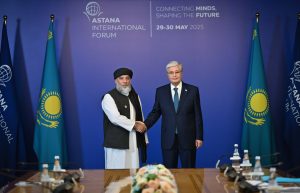On July 10, Kazakh Deputy Prime Minister and Foreign Minister Murat Nurtleu visited Kabul to meet with Taliban officials and discuss future bilateral cooperation. During the trip, Nurtleu held meetings with both the deputy prime minister and the acting foreign minister of Afghanistan.
The visit marks the latest in a series of diplomatic exchanges between the two countries since the Taliban seized power in 2021, following the chaotic withdrawal of U.S. troops. Despite the Taliban remaining on Kazakhstan’s official list of terrorist organizations until 2024, Astana established ties with the new regime as early as September 2021. Since then, dialogue has mainly centered around boosting trade and developing transportation networks.
At the same time, Afghanistan’s presence in Kazakhstan has visibly expanded. Just last year, a Taliban-led delegation hosted an exhibition of Afghan goods in Almaty. In neighboring Russia, similar patterns of engagement have emerged. The Kabul-Moscow relationship reached a milestone earlier this month when Russia became the first country to officially recognize the Taliban government.
Despite the growing relationship, Kazakhstan yet to formally recognize the Taliban-led government.
Kazakhstan continues to engage with the Taliban regime at an accelerating pace, even without recognizing its legitimacy. Nurtleu’s recent trip to Kabul further demonstrated this, with discussions covering agriculture, digitalization, trade, and logistics.
Most notably, the Kazakh foreign minister signed a memorandum reportedly pledging $500 million in investment for a railway project in western Afghanistan. The railway would stretch from the town of Turgundi, near the Turkmen border, to the city of Herat, about 100 kilometers further inside Afghanistan. It would serve as a key piece of infrastructure for Kazakhstan, allowing the movement of goods toward Pakistani seaports, thereby reducing reliance on northern routes through Russia.
Beyond transit, the two countries also hope to boost bilateral trade. “Today, Afghanistan has become one of our important partners with whom we are actively developing a trade and economic agenda,” Nurtleu stated. He went on to say that the two sides aim to increase trade turnover to $3 billion. “To this end, Kazakhstan is ready to increase the supply of agricultural products, fuel and lubricants, mineral fertilizers, and chemical industry goods.”
That would be a massive rise, considering that trade turnover between the two countries in 2024 stood at just $545 million, with 97 percent of that coming from Kazakh exports. Even so, these numbers already place Kazakhstan among Afghanistan’s top trading partners.
High-level meetings between Kazakh and Afghan officials are becoming increasingly common. In May, acting Taliban Minister of Commerce and Industry Nooruddin Aziz attended the Astana International Forum. There, he met directly with President Kassym-Jomart Tokayev, the first such meeting with a Taliban official.
Although no major deals came out of the meeting, the significance was hard to miss. This was the first time Tokayev had publicly met with Taliban representatives, made possible only after the group’s removal from Kazakhstan’s list of terrorist organizations 19 years after it was first added.
Explaining the decision for the removal in June 2024, Tokayev said: “Kazakhstan removed the Taliban regime from the terrorist list based on the importance of developing trade and economic cooperation with modern Afghanistan. This regime is a long-term factor in the region, and we must work with it.”
Kazakhstan’s deepening ties with the Taliban mirror Russia’s trajectory in many ways. Both countries initially condemned the group but quickly pivoted to pragmatic engagement. Since 2021, Russia has expanded trade with Afghanistan and sent several aid packages, all while the Taliban remained designated as a terror organization.
That changed in April 2025, when Moscow officially delisted the group. Then in early July, Russia became the first country to recognize the Taliban as Afghanistan’s legitimate government – a move that prompted the raising of the Taliban’s distinctive white-and-black flag over the Afghan embassy in Moscow.
Whether Kazakhstan will follow suit is still an open question. But given the increasing number of diplomatic meetings, infrastructure commitments, and trade ambitions, formal recognition appears to be less a matter of if than when. Whether driven by commerce or regional security, the logic is becoming harder to ignore.

































